Abstract
1. The relative potencies of amiloride (5 and 20 mg) and spironolactone (25 and 100 mg) for plasma and erythrocyte electrolytes were investigated in a double-blind, randomised, balanced, crossover study in 12 normal men treated concomitantly with hydrochlorothiazide 100 mg daily for 1 week. 2. Participants satisfied an a priori requirement for a fall in plasma potassium concentration of at least 0.5 mmol l-1 after 7 days of treatment with hydrochlorothiazide alone. 3. After hydrochlorothiazide alone, plasma potassium and sodium concentrations fell (P < 0.001). There were associated reductions in erythrocyte sodium (P < 0.01). Plasma magnesium concentration did not change, although erythrocyte magnesium decreased (P < 0.001). 4. Both amiloride and spironolactone attenuated the thiazide-induced fall in plasma potassium (relative potency, amiloride:spironolactone 10:1, 95% confidence interval 6.3-16.2:1). Amiloride but not spironolactone was associated with a dose-related increase in plasma magnesium; a relative potency estimation was precluded. There was little evidence of influences of amiloride or spironolactone on erythrocyte electrolytes. 5. On a weight basis, amiloride is ten times more potent than spironolactone as a potassium-sparing agent in diuretic-treated subjects but neither agent had major effects on erythrocyte potassium. The drugs may have divergent actions on magnesium handling; hydrochlorothiazide alone had no influence on plasma magnesium.
Full text
PDF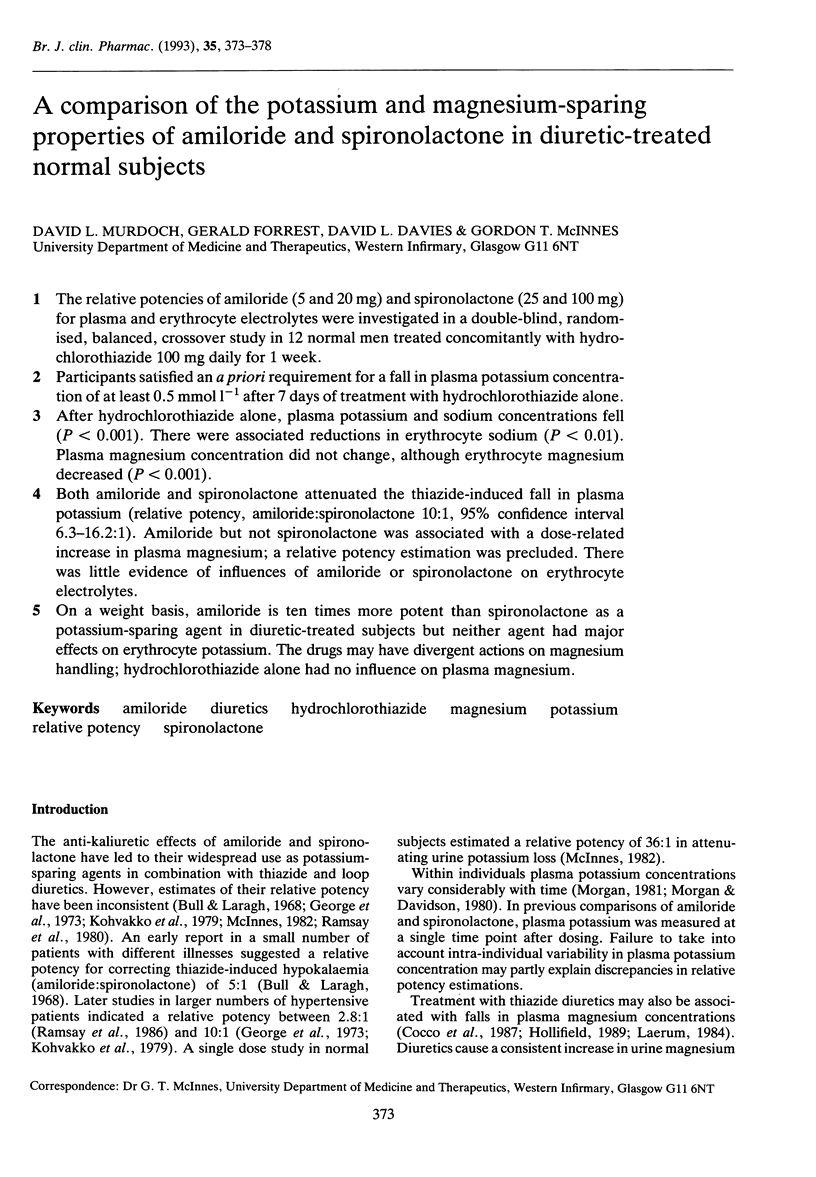
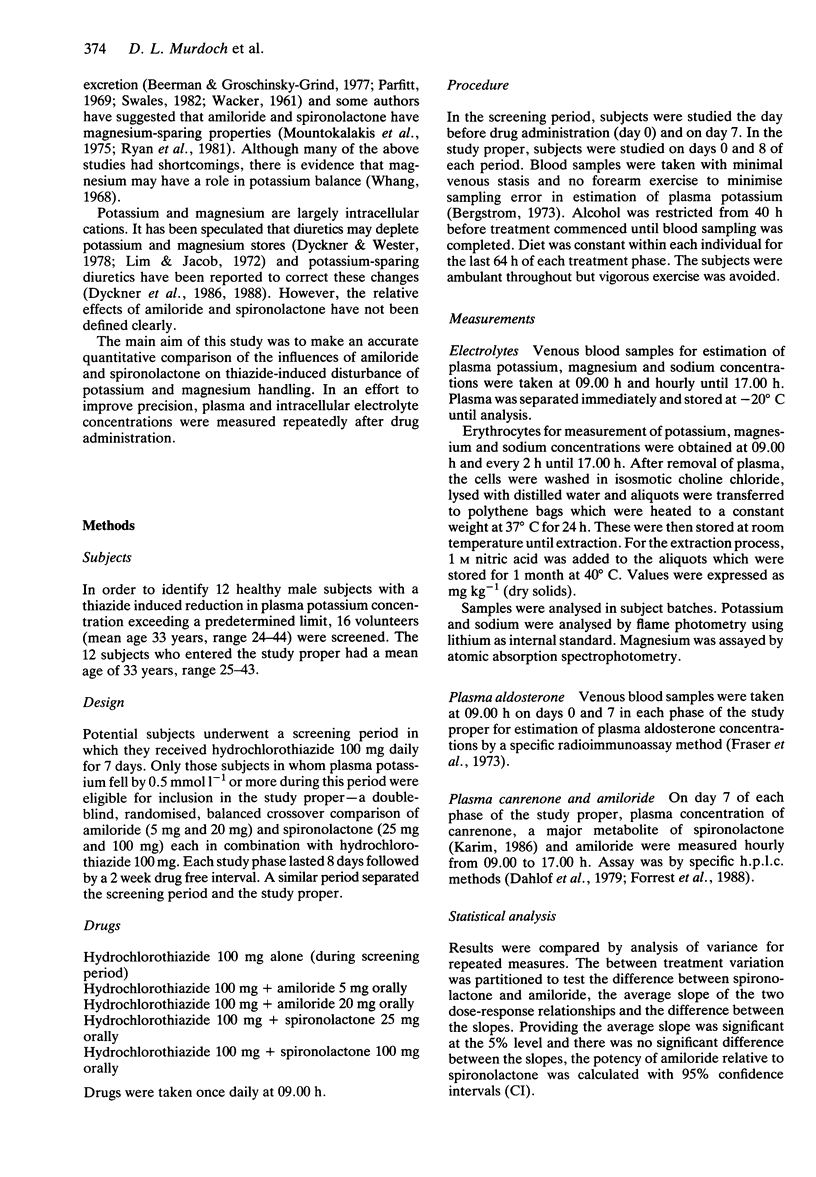
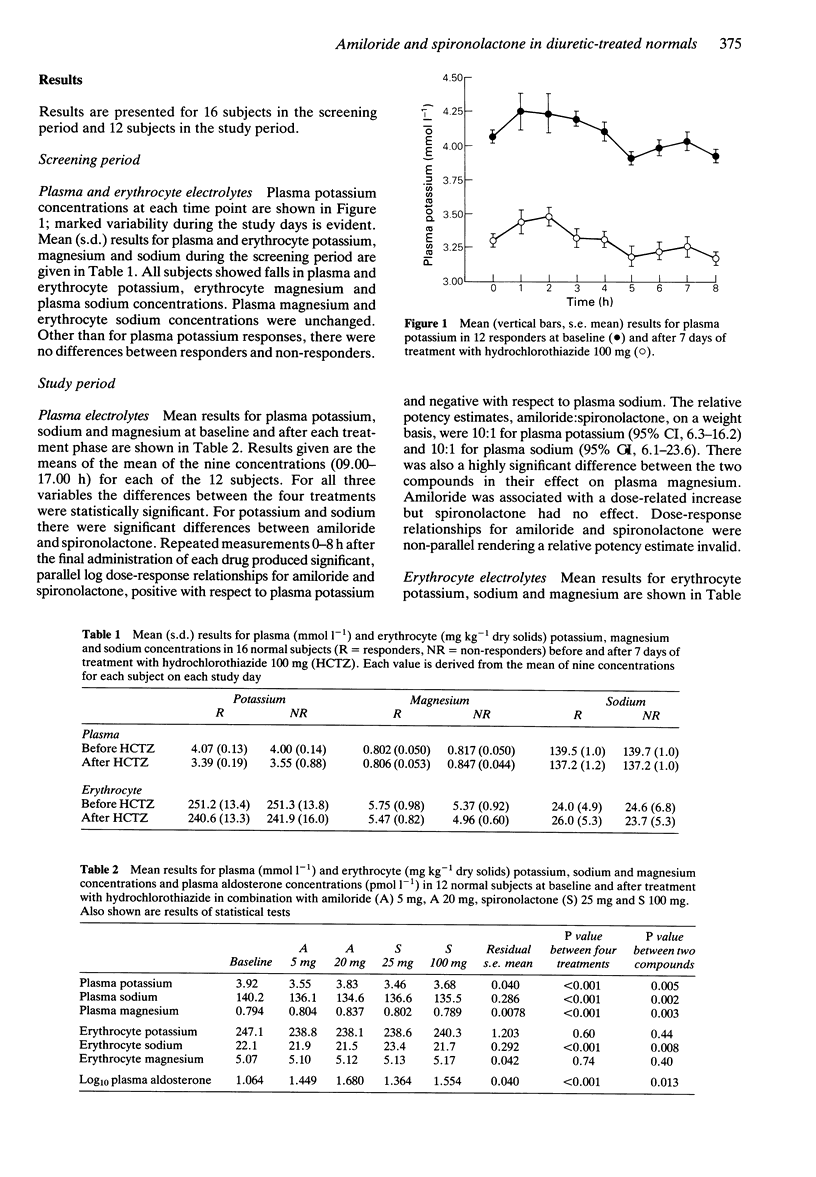
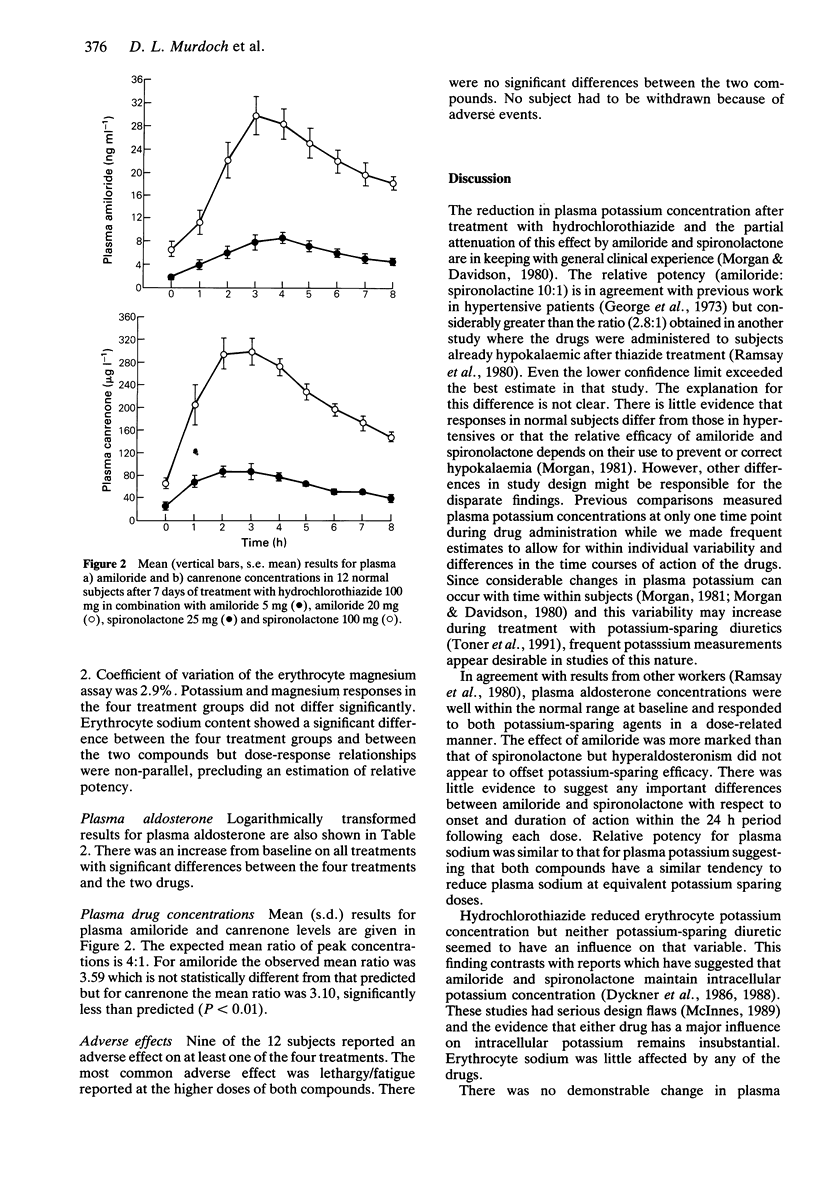
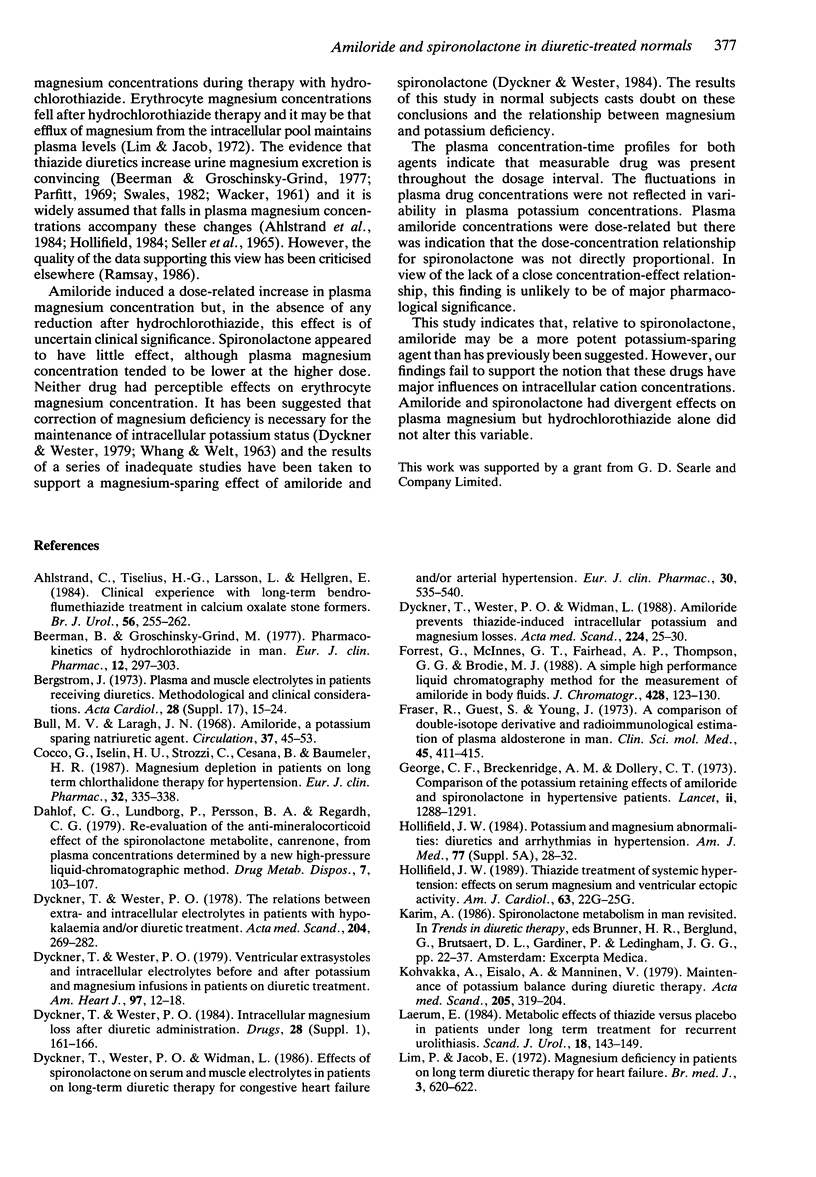
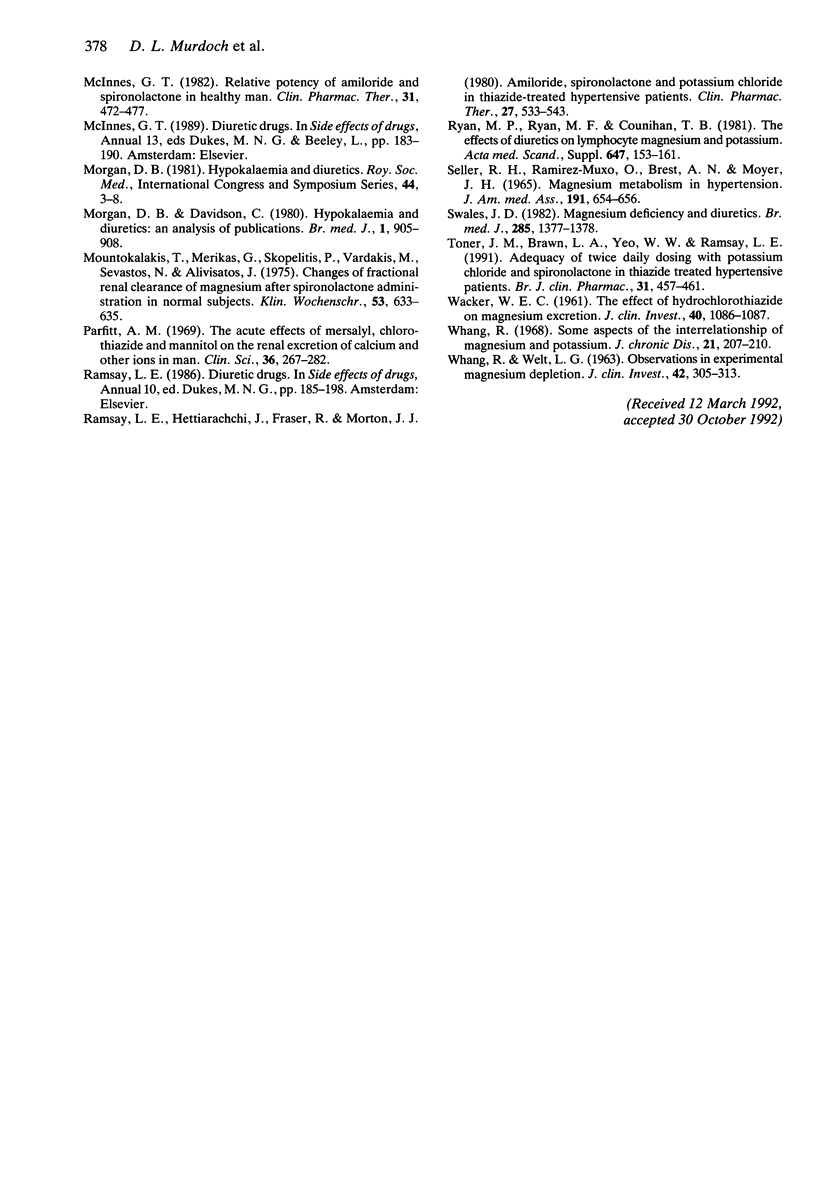
Selected References
These references are in PubMed. This may not be the complete list of references from this article.
- Ahlstrand C., Tiselius H. G., Larsson L., Hellgren E. Clinical experience with long-term bendroflumethiazide treatment in calcium oxalate stone formers. Br J Urol. 1984 Jun;56(3):255–262. doi: 10.1111/j.1464-410x.1984.tb05383.x. [DOI] [PubMed] [Google Scholar]
- Beermann B., Groschinsky-Grind M. Pharmacokinetics of hydrochlorothiazide in man. Eur J Clin Pharmacol. 1977 Dec 2;12(4):297–303. doi: 10.1007/BF00607430. [DOI] [PubMed] [Google Scholar]
- Bergström J. Plasma and muscle electrolytes in patients receiving diuretics. Methodological and clinical considerations. Acta Cardiol. 1973;(Suppl):15–24. [PubMed] [Google Scholar]
- Bull M. B., Laragh J. H. Amiloride. A potassium-sparing natriuretic agent. Circulation. 1968 Jan;37(1):45–53. doi: 10.1161/01.cir.37.1.45. [DOI] [PubMed] [Google Scholar]
- Cocco G., Iselin H. U., Strozzi C., Cesana B., Baumeler H. R. Magnesium depletion in patients on long-term chlorthalidone therapy for essential hypertension. Eur J Clin Pharmacol. 1987;32(4):335–338. doi: 10.1007/BF00543964. [DOI] [PubMed] [Google Scholar]
- Dahlöf C. G., Lundborg P., Persson B. A., Regårdh C. G. Re-evaluation of the antimineralocorticoid effect of the spironolactone metabolite, canrenone, from plasma concentrations determined by a new high-pressure liquid-chromatographic method. Drug Metab Dispos. 1979 Mar-Apr;7(2):103–107. [PubMed] [Google Scholar]
- Dyckner T., Wester P. O. Intracellular magnesium loss after diuretic administration. Drugs. 1984 Oct;28 (Suppl 1):161–166. doi: 10.2165/00003495-198400281-00016. [DOI] [PubMed] [Google Scholar]
- Dyckner T., Wester P. O. The relation between extra- and intracellular electrolytes in patients with hypokalemia and/or diuretic treatment. Acta Med Scand. 1978;204(4):269–282. doi: 10.1111/j.0954-6820.1978.tb08438.x. [DOI] [PubMed] [Google Scholar]
- Dyckner T., Wester P. O. Ventricular extrasystoles and intracellular electrolytes before and after potassium and magnesium infusions in patients on diuretic treatment. Am Heart J. 1979 Jan;97(1):12–18. doi: 10.1016/0002-8703(79)90108-x. [DOI] [PubMed] [Google Scholar]
- Dyckner T., Wester P. O., Widman L. Amiloride prevents thiazide-induced intracellular potassium and magnesium losses. Acta Med Scand. 1988;224(1):25–30. doi: 10.1111/j.0954-6820.1988.tb16734.x. [DOI] [PubMed] [Google Scholar]
- Dyckner T., Wester P. O., Widman L. Effects of spironolactone on serum and muscle electrolytes in patients on long-term diuretic therapy for congestive heart failure and/or arterial hypertension. Eur J Clin Pharmacol. 1986;30(5):535–540. doi: 10.1007/BF00542411. [DOI] [PubMed] [Google Scholar]
- Forrest G., McInnes G. T., Fairhead A. P., Thompson G. G., Brodie M. J. Simple high-performance liquid chromatographic method for the measurement of amiloride in body fluids. J Chromatogr. 1988 Jun 24;428(1):123–130. doi: 10.1016/s0378-4347(00)83896-7. [DOI] [PubMed] [Google Scholar]
- Fraser R., Guest S., Young J. A comparison of double-isotope derivative and radioimmunological estimation of plasma aldosterone concentration in man. Clin Sci Mol Med. 1973 Sep;45(3):411–415. doi: 10.1042/cs0450411. [DOI] [PubMed] [Google Scholar]
- George C. F., Breckenridge A. M., Dollery C. T. Comparison of the potassium- retaining effects of amiloride and spironolactone in hypertensive patients with thiazide-induced hypokalaemia. Lancet. 1973 Dec 8;2(7841):1288–1291. doi: 10.1016/s0140-6736(73)92869-9. [DOI] [PubMed] [Google Scholar]
- Hollifield J. W. Potassium and magnesium abnormalities: diuretics and arrhythmias in hypertension. Am J Med. 1984 Nov 5;77(5A):28–32. doi: 10.1016/s0002-9343(84)80005-4. [DOI] [PubMed] [Google Scholar]
- Hollifield J. W. Thiazide treatment of systemic hypertension: effects on serum magnesium and ventricular ectopic activity. Am J Cardiol. 1989 Apr 18;63(14):22G–25G. doi: 10.1016/0002-9149(89)90214-2. [DOI] [PubMed] [Google Scholar]
- Kohvakka A., Eisalo A., Manninen V. Maintenance of potassium balance during diuretic therapy. Acta Med Scand. 1979;205(4):319–324. doi: 10.1111/j.0954-6820.1979.tb06056.x. [DOI] [PubMed] [Google Scholar]
- Laerum E. Metabolic effects of thiazide versus placebo in patients under long-term treatment for recurrent urolithiasis. Scand J Urol Nephrol. 1984;18(2):143–149. doi: 10.3109/00365598409182182. [DOI] [PubMed] [Google Scholar]
- Lim P., Jacob E. Magnesium deficiency in patients on long-term diuretic therapy for heart failure. Br Med J. 1972 Sep 9;3(5827):620–622. doi: 10.1136/bmj.3.5827.620. [DOI] [PMC free article] [PubMed] [Google Scholar]
- McInnes G. T. Relative potency of amiloride and spironolactone in healthy man. Clin Pharmacol Ther. 1982 Apr;31(4):472–477. doi: 10.1038/clpt.1982.62. [DOI] [PubMed] [Google Scholar]
- Morgan D. B., Davidson C. Hypokalaemia and diuretics: an analysis of publications. Br Med J. 1980 Mar 29;280(6218):905–908. doi: 10.1136/bmj.280.6218.905. [DOI] [PMC free article] [PubMed] [Google Scholar]
- Mountokalakis T., Merikas G., Skipelitis P., Vardakis M., Sevastos N., Alivisatos J. Changes of fractional renal clearance of magnesium after spironolactone administration in normal subjects. Klin Wochenschr. 1975 Jul 1;53(13):633–635. doi: 10.1007/BF01469684. [DOI] [PubMed] [Google Scholar]
- Parfitt A. M. The acute effects of mersalyl, chlorothiazide and mannitol on the renal excretion of calcium and other ions in man. Clin Sci. 1969 Apr;36(2):267–282. [PubMed] [Google Scholar]
- Ramsay L. E., Hettiarachchi J., Fraser R., Morton J. J. Amiloride, spironolactone, and potassium chloride in thiazide-treated hypertensive patients. Clin Pharmacol Ther. 1980 Apr;27(4):533–543. doi: 10.1038/clpt.1980.75. [DOI] [PubMed] [Google Scholar]
- Ryan M. P., Ryan M. F., Counihan T. B. The effect of diuretics on lymphocyte magnesium and potassium. Acta Med Scand Suppl. 1981;647:153–161. doi: 10.1111/j.0954-6820.1981.tb02651.x. [DOI] [PubMed] [Google Scholar]
- SELLER R. H., RAMIREZ-MUXO O., BREST A. N., MOYER J. H. MAGNESIUM METABOLISM IN HYPERTENSION. JAMA. 1965 Feb 22;191:654–656. doi: 10.1001/jama.1965.03080080044012. [DOI] [PubMed] [Google Scholar]
- Swales J. D. Magnesium deficiency and diuretics. Br Med J (Clin Res Ed) 1982 Nov 13;285(6352):1377–1378. doi: 10.1136/bmj.285.6352.1377. [DOI] [PMC free article] [PubMed] [Google Scholar]
- Toner J. M., Brawn L. A., Yeo W. W., Ramsay L. E. Adequacy of twice daily dosing with potassium chloride and spironolactone in thiazide treated hypertensive patients. Br J Clin Pharmacol. 1991 Apr;31(4):457–461. doi: 10.1111/j.1365-2125.1991.tb05562.x. [DOI] [PMC free article] [PubMed] [Google Scholar]
- WHANG R., WELT L. G. Observations in experimental magnesium depletion. J Clin Invest. 1963 Mar;42:305–313. doi: 10.1172/JCI104717. [DOI] [PMC free article] [PubMed] [Google Scholar]
- Whang R. Some aspects of the interrlationship of magnesium and potassium. J Chronic Dis. 1968 Jul;21(4):207–210. doi: 10.1016/0021-9681(68)90057-x. [DOI] [PubMed] [Google Scholar]


